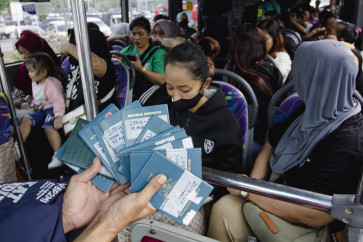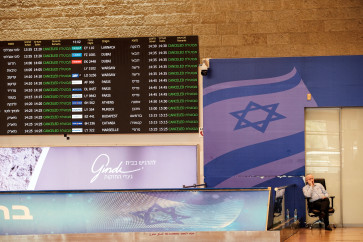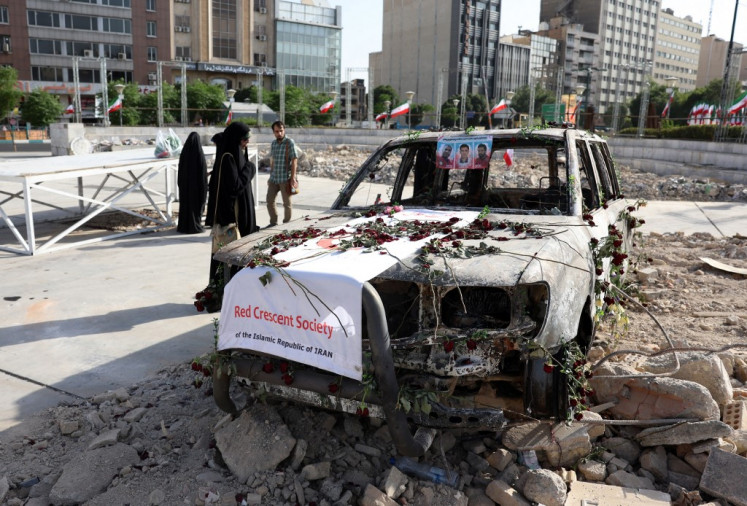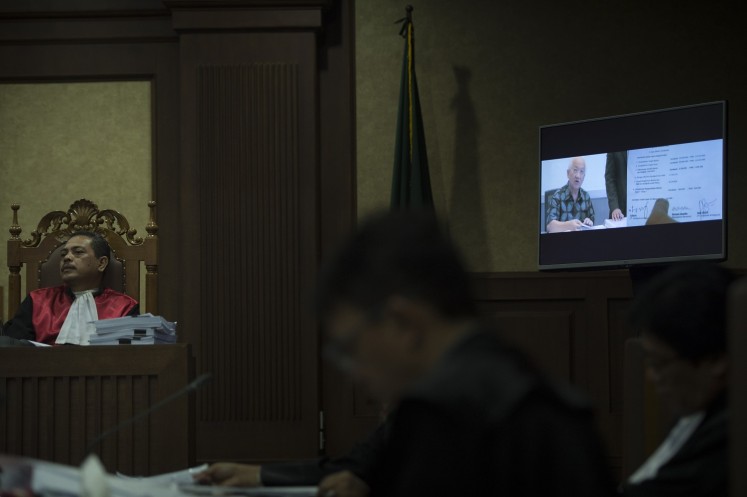Popular Reads
Top Results
Can't find what you're looking for?
View all search resultsPopular Reads
Top Results
Can't find what you're looking for?
View all search resultsSuroboyo bus receives warm welcome despite glitch
Joyride: Rusmiyati, 41, a resident of Sidoarjo regency, East Java, smiles while lining up to pay for a Suroboyo bus ticket with used plastic bottles on Wednesday
Change text size
Gift Premium Articles
to Anyone

J
oyride: Rusmiyati, 41, a resident of Sidoarjo regency, East Java, smiles while lining up to pay for a Suroboyo bus ticket with used plastic bottles on Wednesday.(JP/Wahyoe Boediwardhana)
Qoriah, 55, a teacher who lives in Gedangan district, Sidoarjo regency, East Java, was seen eagerly waiting for a Suroboyo bus at a bus stop in the provincial capital Surabaya last Wednesday.
She said she had been looking forward to trying the new service — which offers free bus trips in exchange for used plastic bottles as payment — since it was launched by the Surabaya administration last April.
That Wednesday, Qoriah had the chance to take the bus along with several of her friends from Sidoarjo. Each carried a bag full of empty plastic bottles.
“We don’t pay for the bus ticket with money, but with these used plastic bottles. This is a good way to educate people about caring for their environment,” Qoriah said.
For a single 19-kilometer trip from the Purabaya bus terminal to a bus stop on Jl. Rajawali, passengers have the option of paying with 10 plastic cups, five 500-milliliter bottles or three 1.5-liter bottles.
Ten Suroboyo buses, comprising eight single-deck buses and two double-deckers, have been operating since the campaign launched in April.
The red single-deck buses travel a route connecting the western part of the city to the east, while the yellow double-deckers serve the north-south Surabaya route.
With a capacity of 67 passengers, the single-deck buses come with various facilities, such as a CCTV camera for security purposes, a LED TV screen to display information and equipment to help people with disabilities embark and disembark.
During the first few weeks of its operation, the service catered to roughly 1,500 passengers a day. It has since decreased to about 750 passengers a day.
People from Surabaya’s neighboring regions, like Gresik, are also eager to try the service.
“This is new. And as far as I know, it does not exist in other places,” said Tursilawati, a Gresik resident who came to Surabaya with her family on Wednesday just to use the Suroboyo bus.
When launching the service in April, Surabaya Mayor Tri Rismaharini expressed her hope that it could help reduce plastic waste in the city.
“We are very serious about plastic waste. This is our commitment to address it,” Risma said, adding that the plastic collected from the operation of the buses would be deposited in waste banks to be recycled into more useful materials.
Six months after its launch, the campaign gathered 23.5 tons of plastic bottles in different sizes, according to the Surabaya Sanitation and Green Space Agency.
However, the agency later realized that the bottles could not be recycled as promised or be converted into cash due to a lack of regulation, prompting it to temporarily stash them in a number of waste banks, compost houses and warehouses.
To help solve the problem of piling bottles, Surabaya councillor Baktiono suggested that they be donated to home industries or small business that can use them to produce handicrafts, and to convert the buses into free modes of transportation or school buses, or use them for historical and ecotourism tours.









